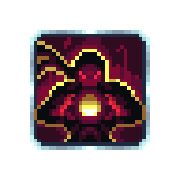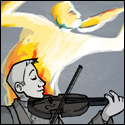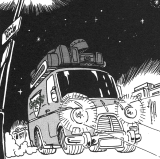|
Leperflesh posted:Your characters can (could? Haven't planed a modern version) die during character creation in Traveler. To some extent, creating a character in that system was a standalone game, with an endpoint that usually gave you the option of playing a different game. You can get horrifically injured but not die, unless you use an optional hardcore rule. Then you can go into massive medical debt which you then have to pay off when play starts. The mongoose version has some neat inter character synergy mechanics, and you really want to make your team of intracosmic fuckups as a group. You also want to play pirates of drinax because it slaps
|
|
|
|

|
| # ? Jun 23, 2024 00:37 |
|
The traveller character gen will generally give you some kind of backstory, though you won't necessarily get what you want in terms of what your character can do skill-wise.
|
|
|
|
The 2d20 star trek life path is neat because it walks you through your character's life history assigning stats and then ends with "here's a bunch of extra points to just jam whereever"
|
|
|
|
more on Solasta: * the Fighter leveled to 2, and gained Action Surge * the Paladin leveled to 2, and: - gained Divine Smite - gained a Fighting Style; I chose Protection - gained Paladin spellcasting; I prepared Bless, Cure Wounds, Divine Favor, and Shield of Faith * the Sorcerer leveled to 2, and: - gained one 1st-level spell slot - gained the Sorcery Points ability - gained the Flexible Casting ability - gained the Rift Deflection ability (I think this one isn't in the SRD - it lets the Sorc use their Bonus Action to spend 1 Sorcery Point to increase AC and saves for one turn) - learned one new spell; I chose Jump * the Cleric leveled to 2, and: - gained one 1st-level spell slot - gained the Channel Divinity ability - since she's a Life Cleric, Channel Ability uses are Turn Undead and Preserve Life * clever little framing device to use the intro to get the party to level 2 so you never have the problems of adventuring as level 1 characters * my first real combat is a random encounter with bandits, with the party having been Surprised while camping out in the wilderness - the game helpfully tells you that you're going to take a Long Rest right after this anyway, so might as well let loose with all your spells; I bring this up because it's a nice "fourth-wall breaking" thing to say as if the game was a generous DM - when the Paladin's Protection Fighting Style is triggered by a bandit attacking the Cleric that the Paladin is adjacent to, you get a dialog box that interrupts the AI's turn to ask you if you want to use it or not. This seems like a decent way to handle such mechanics. - I tried looking for the Divine Smite button, and couldn't find it, and just made a regular attack instead. As it turns out, the game rolls the attack first, then, if it's a hit, gives you an interrupting dialog box to ask if you want to Smite. It even tells you how many spell slots you have left to Smite with. - besides Smite and Protection, I got to play around with using Action Surge, and having the Sorcerer cast Guiding Bolt, and then the Fighter taking... advantage... of the Advantage granted by Guiding Bolt. That the rolling animation shows two green dice on Advantage and two red dice on Disadvantage is a nice touch. Question: either I missed the part where it explains how to handle spellcasting components, or the tutorial didn't cover it. I was not able to cast spells with the Cleric because she didn't have a free hand because she had a mace and shield equipped. I did get to cast Healing Word, because that doesn't need a free hand. How do I deal with this in the future? Set-up a weapon-swap slot that's a mace and [nothing]? * at the conclusion of the bandit fight, the game tells you that this was a rigged, scripted event that always happens, for the purposes of setting up the tutorial. It does this because there's one particular class ability that's supposed to prevent ever getting surprised, and they presumably want to reassure the player that this is not a bug. Again, I find that kind of honesty from the game's interface refreshing.
|
|
|
|
gradenko_2000 posted:Question: either I missed the part where it explains how to handle spellcasting components, or the tutorial didn't cover it. I was not able to cast spells with the Cleric because she didn't have a free hand because she had a mace and shield equipped. I did get to cast Healing Word, because that doesn't need a free hand. How do I deal with this in the future? Set-up a weapon-swap slot that's a mace and [nothing]? I asked a friend who's big into Solasta. His response: "There are two options One - Keep one of your weapon sets with a free hand. I THINK that two handed weapons still count as "One free hand", so you should be able to cast with a crossbow equipped (I am not certain though) Two - Go to Difficulty settings, one of the options let's you specify whether your casters need a free hand or not for Somatic component spells."
|
|
|
|
The last DM I played with enforced that same rule of clerics having a hand free and I hate it; really seems to be at odds with how a cleric is intended to be played, both mechanically and thematically.
|
|
|
|
Jack B Nimble posted:[rule] seems to be at odds with how [game] is intended to be played, both mechanically and thematically.
|
|
|
|
gradenko_2000 posted:
You can swap weapon sets once per turn, so you can either have one set without a weapon/shield, or you can change needing a free hand in the difficulty settings. Note that removing the free hand requirement makes the game much easier.
|
|
|
|
I thiiink I actually ran into in Pathfinder? I could be wrong but I think it's an implied problem all the way back into, what, second edition? Because spells have somatic components, and how can you touch someone if your hands are free, etc etc. I think it just got (along with everything else) a lot more codified and inarguable in third edition and later. But then you play Baldur's Gate 1 and 2, and Pathfinder Kingmaker, and your weapons just conveniently don't matter for spells, and it's fine.
|
|
|
|
Thanks for the reply, Arivia and ninjoatse.cxJack B Nimble posted:Pathfinder Kingmaker I'm playing this one on the playstation and it is gobsmackingly accurate to PF. I'm doing much closer coverage of Solasta because "how do you make 5e work in a PC game when the rulebook has so many holes in it?" is an interesting question, and I assume PF Kingmaker is much more well-known.
|
|
|
|
Solasta is a charming little game that I haven't had time to finish but whose implementation really impresses me. Besides fiddly inventory stuff like having a free hand for somatic components it also pays a lot of attention to elevation and lighting, such that you really start caring about having torches or environmental light sources going to stop all your attacks from having disadvantage. I think Solasta actually stands as proof that 5e IS written with a lot of rigor, because while they've had to invent their own subclasses they haven't had to invent their own combat rules in pretty much any case. The actual problems with the game are matters of ideology more so than craft.
|
|
|
|
Jack B Nimble posted:I thiiink I actually ran into in Pathfinder? I could be wrong but I think it's an implied problem all the way back into, what, second edition? Because spells have somatic components, and how can you touch someone if your hands are free, etc etc. I think it just got (along with everything else) a lot more codified and inarguable in third edition and later. This kind of thing is forgotten in a ton of places. I think 5e had a magical item for Bards that actually only affected one spell in the game, because it was the only one with a component that actually required the item. Meanwhile in Pathfinder 2e there's creatures who can't cast half their spells because they don't have the limbs to do so.
|
|
|
|
Many of the spells that just have holes in them aren't in the game. I love the game, but one of the early fights is just a fight you may have to play several times/change the diffciulty/add custom rules because the RNG can just outright slaughter you. If you can't beat a fight and think it's total horse poo poo. You may not be doing anything wrong, and may just be suffering from 5e being a game of chance. Don't feel bad if you have to tone down the difficulty for a single fight, then turn it back up. I think it's level 4 or 5 where everyone can pretty much hold their own.
|
|
|
|
Jack B Nimble posted:I thiiink I actually ran into in Pathfinder? I could be wrong but I think it's an implied problem all the way back into, what, second edition? Because spells have somatic components, and how can you touch someone if your hands are free, etc etc. I think it just got (along with everything else) a lot more codified and inarguable in third edition and later. in pathfinder and i believe in 3e, there's items you can buy to add a holy symbol to your shield, so you can cast with both hands full
|
|
|
|
Ferrinus posted:Solasta is a charming little game that I haven't had time to finish but whose implementation really impresses me. Besides fiddly inventory stuff like having a free hand for somatic components it also pays a lot of attention to elevation and lighting, such that you really start caring about having torches or environmental light sources going to stop all your attacks from having disadvantage. Only play Dwarves. All problems solved
|
|
|
|
Solasta's a wonderful illustration of how annoying it would be if your DM actually implemented the rules for darkness and low light levels
|
|
|
|
ninjoatse.cx posted:Only play Dwarves. All problems solved I think I ended up with like half-elf, halfling (the subrace with darkvision), elf (wisdom), elf (int) for this reason. But there's that big fight that gives you some human NPCs to control alongside your party so you gotta have a care anyway.
|
|
|
|
PerniciousKnid posted:Is there an RPG that's just character creation? That seems like a thing that would exist. There's a pretty fun board game that is. It's just called Roll Player. It's basically a dice-gathering deck builder but the thing you're doing is assembling a not-D&D character, and you win by achieving character goals, like hitting exact stat goals and stuff. 
|
|
|
|
theironjef posted:There's a pretty fun board game that is. It's just called Roll Player. It's basically a dice-gathering deck builder but the thing you're doing is assembling a not-D&D character, and you win by achieving character goals, like hitting exact stat goals and stuff. That looks fun!
|
|
|
|
theironjef posted:There's a pretty fun board game that is. It's just called Roll Player. It's basically a dice-gathering deck builder but the thing you're doing is assembling a not-D&D character, and you win by achieving character goals, like hitting exact stat goals and stuff.
|
|
|
|
D&D's whole thing of making death gods and the death domain almost universally evil is an interestingly odd tic considering how death gods in most religions in human history were both very important and very positively portrayed. Funeral rites are like, half the job of a priesthood but apparently in D&D land that makes you a moustache twirling villain.
MarsPearl fucked around with this message at 08:03 on Sep 2, 2022 |
|
|
|
MarsPearl posted:D&D's whole thing of making death gods and the death domain almost universally evil is an interestingly odd tic considering how death gods in most religions in human history were both very important and very positively portrayed. Funeral rites are like, half the job of of a priesthood but apparently in D&D land that makes you a moustache twirling villain. This isn’t quite true. The god of the dead in the Forgotten Realms has been LN since mid 2e, and other settings have non-evil death gods as well. The problem is usually that there’s a big impetus to have an evil necromancer cleric build since that’s a classic archetype, and that gets given the game mechanic called “Death Domain.” (To oppose a standard PC healing and light cleric) It becomes really obvious that there needs to be a non-evil cleric of the dead option (usually called “Repose Domain”) and this sticks out more now because 3.0 realized this problem and fixed it in less than a year after the release of the core rulebooks, so 5e of course made the same mistake and took longer to fix it.
|
|
|
|
In 3e and after its more to reflect that death clerics get all the murder spells and less the passage into the next realm.
|
|
|
|
Should've been Death vs. Undeath
|
|
|
|
|
Nessus posted:Should've been Death vs. Undeath
|
|
|
|
Splicer posted:Was about to say, this isn't hard. Undeath bad, resurrection good. Death still bad, experience points good
|
|
|
|
4e has the archlich, which is basically undeath good as long as you don’t take shortcuts
|
|
|
|
cleric of undeath (dasharez0ne) e: just walk out. YOU CAN LEAVE! work outer planes dungeon too fancy wizard store wall of the faithless being dead Inevitables if your quick IF IT SUCKS... HIT DA BRICKS Tuxedo Catfish fucked around with this message at 17:14 on Sep 2, 2022 |
|
|
|
Tuxedo Catfish posted:cleric of undeath (dasharez0ne)  And in fairness I think this is a fantasy trope that extends somewhat beyond DnD though DnD may be something of a start point. Nerds often have a cultural fear of death that is unusual and outstanding compared to broader society, and unsurprisingly this means that like Hades is just portrayed as a flat out villain fairly frequently. Dominions 5 practically feels refreshing and exciting just because it treats Death magic as "something a society would use in a pragmatic way" and the Nature magic is not just uwu safe and nice but often kind of terrifying and dangerous (which, remember kids, fertility cults can be murderous as hell). I think in general the anthropology of having access to magic is not thought through very much. I don't really blame authors for this, but I do like it when they do think it through. One that I've used in RPGs I just fully lifted from Caine Black Knife - the solar-law paladin types have access to some very potent healing magic, and they incorporate this into their rituals. Which of course means that you have to injure people in the course of the rituals in order to have wounds to heal, right? So some of their rituals involve stuff like ripping open a person's abdomen and sticking your hand right in, because once you can heal major wounds in seconds you get loving weird about it.
|
|
|
|
i think being terrified of death is the norm for most people in most eras and contexts and being ambivalent to it is, at least in the context of English-speaking western countries, a weird loving Victorian affectation that we haven't managed to get over yet e: although we might be describing slightly different things since i would say the same thing about the origins of our extremely romanticized ideas about nature, and treating proximity to death as wrong or unclean vs. death itself don't necessarily go hand in hand Tuxedo Catfish fucked around with this message at 18:19 on Sep 2, 2022 |
|
|
|
I think the decision making process was "What domains should the Cleric of the Death Cult have?" and not much more than that.
|
|
|
|
it might not be conscious but i think it absolutely has a great deal to do with christianity casting ghosts and the spirits of the dead as a violation of the natural order rather than a part of it. the key thing isn't death itself, but the extreme and absolute separation of the living and the dead.
|
|
|
|
The geek social fallacy of dying or messing with corpses being bad
|
|
|
|
In Eberron there's the Undying Court of Aerenal.
|
|
|
|
Tuxedo Catfish posted:i think being terrified of death is the norm for most people in most eras and contexts and being ambivalent to it is, at least in the context of English-speaking western countries, a weird loving Victorian affectation that we haven't managed to get over yet Nah, having some sort of comfort around death is definitely not a Victorian-specific thing. Victorians were weird in a lot of ways but their death stuff was some of the least weird things about them. I agree that pretty much everybody has some fear of dying which is why pretty much every culture develops methods for having some way of being comfortable with death. Funerary rites are older than writing for a reason and have a staggering array of expressions. Of course there are all sorts of oddities, like castes that work with death (leatherworkers, executioners) being forbidden from living inside the walls of German cities. Anthropology is cool. In any event from when I was looking at this stuff for class, it seemed like most cultures tended to either treat death as a one-way street or to treat it as a kind of altered state. Either you die and go somewhere else never to interact with the living again, or you die and there's some element of you that stays in the world. Both of these have reasons why you'd find one or the other comforting and there's quite a few different expressions of them. Christianity tends to be the one-way street kind, and so a lot of the anger around ghosts is that ghosts are not compatible with the basic rules of the Christian afterlife, so they're tricks or illusions or lies. Geeks do seem odd in that they seem to think that never ever dying in a physical sense is a reasonable thing to invest in and desire, which is not unique (some parts of Daoism operate on a "eternal life is a matter of alchemy" standing; this has gotten a lot of people killed), but it does feel unusual and outstanding as a cultural thing. Esp since the way DnD is written it sometimes feels like Paladins would burn down funeral homes.
|
|
|
|
Specifically in the context of D&D-like fantasy, I think we can define a spectrum between natural/eusocial death priesthood ("we must preserve life and prevent death whenever possible, but everyone dies eventually, so it's important that we provide end-of-life/post-life services as well") and unnatural/antisocial death priesthood (the usual array of murder, undead-creating, soul-tormenting, etc.), and ideally you can present individual cultural decisions based on this spectrum. Is it respectful to contact the spirits of the dead for advice or information, or are you disturbing their rest? If creating mindless undead doesn't interact with the dead soul at all, is it all right to turn your ancestors' skeletons into free farm labor, if that means surviving a harsh winter? What about raising freshly dead soldiers as zombies, if that would save the lives of others? Or win an invasion? The problem here, as usual, is that D&D conflates the ethical and cultural questions of "how do we cope with the inevitability and massive psychic weight of death?" with the Big Absolute Cosmological Realities of stuff like positive and negative energy, so it ends up providing facile and uninteresting answers. "Look, you know it's evil because it uses the Black Lasers and it has the [Evil] tag in the spell description, okay?!"
|
|
|
|
Tulip posted:Nah, having some sort of comfort around death is definitely not a Victorian-specific thing. Victorians were weird in a lot of ways but their death stuff was some of the least weird things about them.
|
|
|
|
Tuxedo Catfish posted:it might not be conscious but i think it absolutely has a great deal to do with christianity casting ghosts and the spirits of the dead as a violation of the natural order rather than a part of it. the key thing isn't death itself, but the extreme and absolute separation of the living and the dead. Not just Christianity, Judaism also had specific laws against it.
|
|
|
|
And in D&D world, there's lots of proof that death is not the end, so people "should be" a lot less scared about death anyway. Especially if they can afford resurrection. Although maybe they're a lot scared about being stuck as ghosts, or going to one of the many hells that are also definitely real.
|
|
|
|

|
| # ? Jun 23, 2024 00:37 |
|
Leperflesh posted:And in D&D world, there's lots of proof that death is not the end, so people "should be" a lot less scared about death anyway. Especially if they can afford resurrection. Although maybe they're a lot scared about being stuck as ghosts, or going to one of the many hells that are also definitely real. Yeah, I honestly feel like D&D-world attitudes towards a lot of spiritual topics should be much different from (and weirder than) real-world ones, given how many metaphysical issues are just verified physical law. I think I've been thinking about "how do I roleplay a cleric in FR when her god is an actual guy whose existence and general desires are completely known? What form does religion even take in this world?" since I was about 15.
|
|
|

































